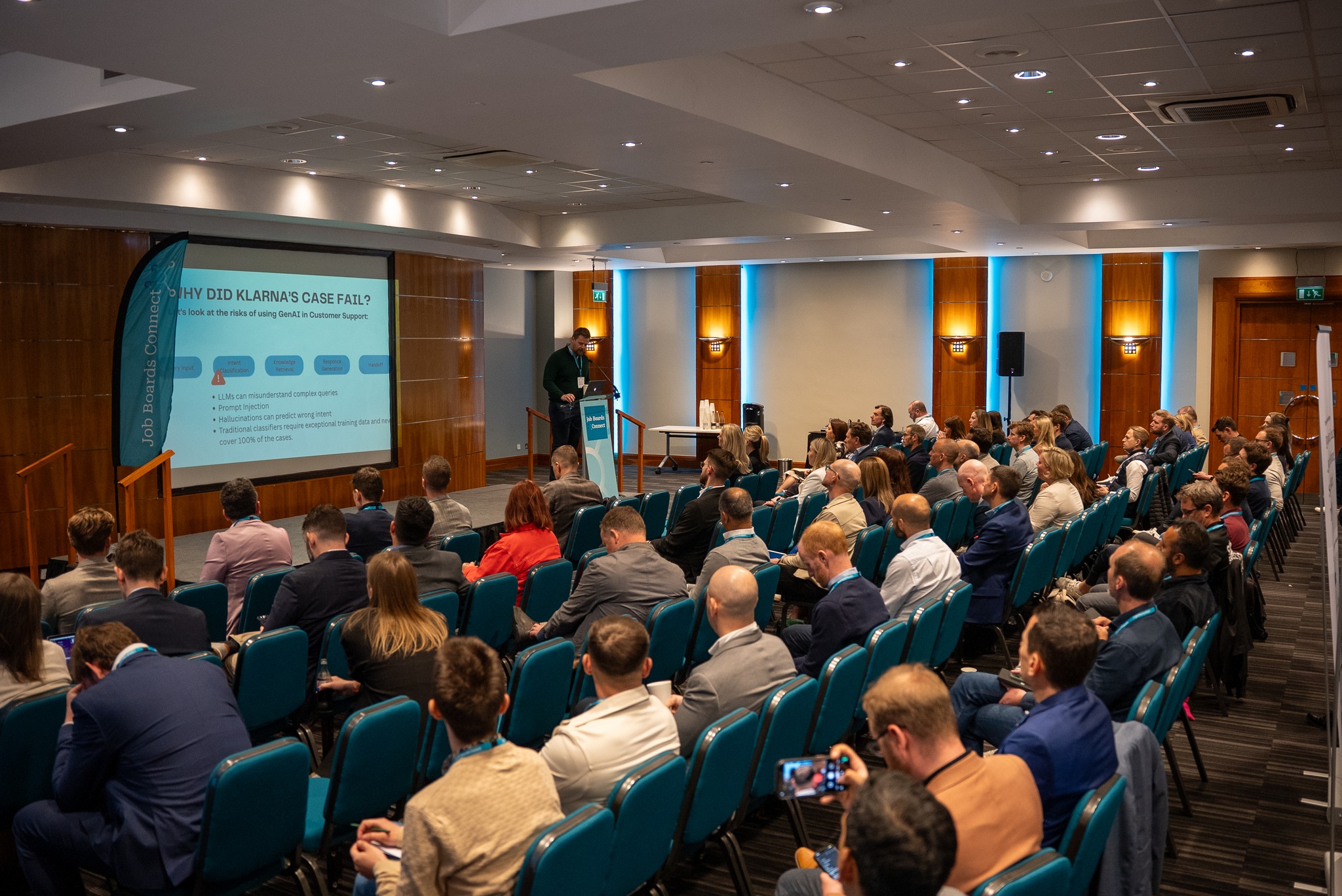London hosted one of the most well-known gatherings in the recruitment advertising space, Job Boards Connect Unplugged 2025, on May 15th.
The event was more than a traditional conference; it was a genuine meeting of minds, bringing together job board founders, technologists, marketers, and industry veterans for an honest conversation about where the job board sector stands now and, more importantly, where it is headed next.
What set this Job Boards Connect Unplugged apart wasn’t just the hype around Artificial Intelligence or the speaker line-up. It was the attendees’ openness to discussing difficult questions and sharing current pain points. Attendees also debated threats and opportunities waiting on the horizon, and in this article, we are pointing out some of the most important ones.
A safety car moment – How AI has hit reset on the whole industry
Our CEO Martin Lenz delivered the phrase that seemed to stick with everyone present:
“AI and changing user behaviours are reshaping how job seekers find, trust, and engage with job boards.”
In a breakout session alongside Lou Goodman (former VP B2B Marketing at Monster / CareerBuilder), Martin leaned into an unusual but powerful analogy for the impact of artificial intelligence on the job board sector.
He explained that we’re living through a “Safety Car” moment, drawing on car racing jargon: “The AI boom is a reset moment, like a safety car in racing. Even companies with major AI investments are now lining up again as powerful tools become widely accessible to all job boards.”
The metaphor resonated with the audience.

Jobiqo CEO Martin Lenz sharing the Safety car metaphor at Job Boards Connect Unplugged 2025
In racing, introducing a safety car doesn’t just slow everyone down; it also bunches up the field, erasing previous gaps and giving every competitor, regardless of their earlier lead, a new chance at victory. Likewise, in recruitment tech, the rapid democratisation of AI tools has levelled the playing field.
When it comes to AI innovation, both giants and smaller companies now face off side by side, with access to similarly powerful digital tools and data processing capabilities.
Martin Lenz made it clear: the days of gaining a lasting edge through proprietary AI alone are over. The field is being reset. It’s what job boards and their leaders do now, with data, networks, and branding, that will truly make the difference in the future.
The real differentiators: data, networks, and brand
Both Martin Lenz and Lou Goodman drove home the point that getting ahead today isn’t about chasing one tech buzzword after another. A true and lasting competitive advantage will stem from harnessing three timeless pillars:
-
Smart data usage,
-
Deep networks and relationships,
-
A bold, memorable brand.
But brand, as the conversation underscored, is so much more than a logo, a font, or a colour scheme. “A brand is more than how you look. It represents the collective perception of your company, shaped by your values, tone of voice, visual identity, and the experiences you deliver. It’s how you live in people’s minds.”
What makes a job board memorable nowadays? Beyond credible design, it’s about delivering on the promise of value at every touchpoint:
-
clear communication with candidates,
-
transparency to clients,
-
high-quality job matches,
-
consistent user experiences, both on desktop and mobile.
Arguably, in a fast-changing industry, the brand increasingly becomes the most important anchor. It’s the reputation that job boards build over time.
And at the foundation of the brand lies actionable, high-quality data.
If job boards can’t use the candidate and clients’ insights, they will struggle to deliver unique value that keeps users (and advertisers) coming back.
The social media and Gen Z impact
One of the most interesting insights was this: “Gen Zs spend 54% more time on social platforms than average.”
Younger generations have fundamentally different expectations when it comes to job search. They aren’t just visiting job boards and submitting CVs; they’re looking for opportunities on TikTok, on Instagram, and evaluating employer reputations from viral posts and interactions.
While social media has been a disruptor for quite some time in other industries, now it takes centre stage in recruitment advertising as well.
Social platforms are no longer secondary channels. For many job seekers, especially digital natives, they’re the primary way to discover, research, and apply to new jobs.
As social media platforms like Facebook, Instagram, and TikTok became the primary way for candidates to discover jobs, and most of the attention is focused on these platforms, job boards must consider them in their advertising efforts.
Jobiqo offers the solution to effortlessly generate and manage eye-catching images and video ads that extend the reach of job boards through the Jobiqo AIR product.
By leveraging Jobiqo AIR‘s potential, job boards can supercharge their marketing efforts with ease.
From clicks to influence – the new age of SEO
The traditional approach to SEO,simply driving web traffic through keyword optimisation, is being replaced by something bigger. As the group of job boards discussed, “SEO is becoming about influence, not just traffic.”
Search algorithms are still gatekeepers, but with the advent of AI and large language models, the goal is shifting. Now, being the authoritative, trusted source that informs AI-generated content is just as valuable as ranking on the first page of Google. SEO strategies now prioritise creating content that is both human and AI-readable, structured for clarity, and considering search crawlers.
Sometimes the “win” isn’t just a click, but the silent influence the brand or content exerts behind the scenes.









